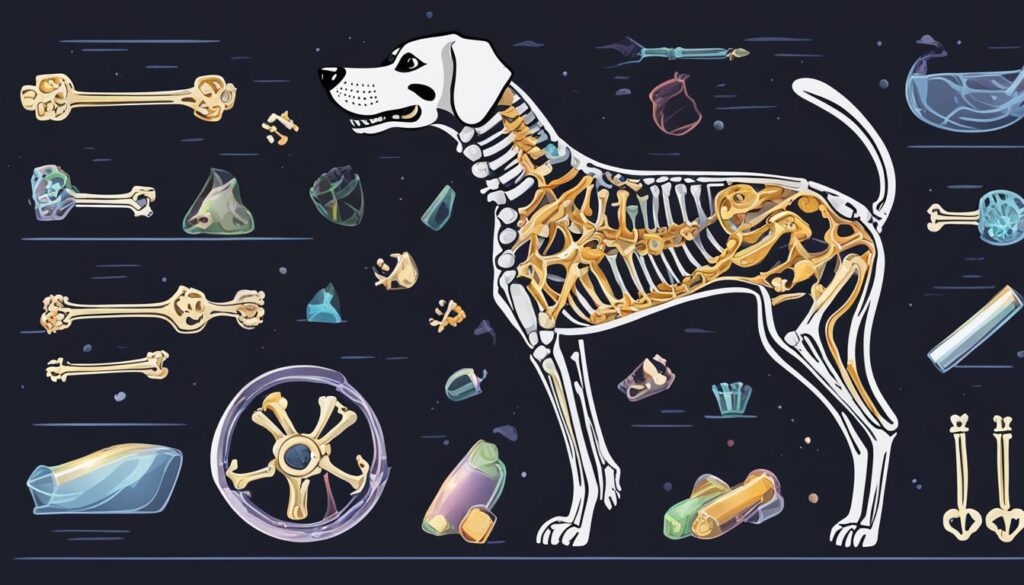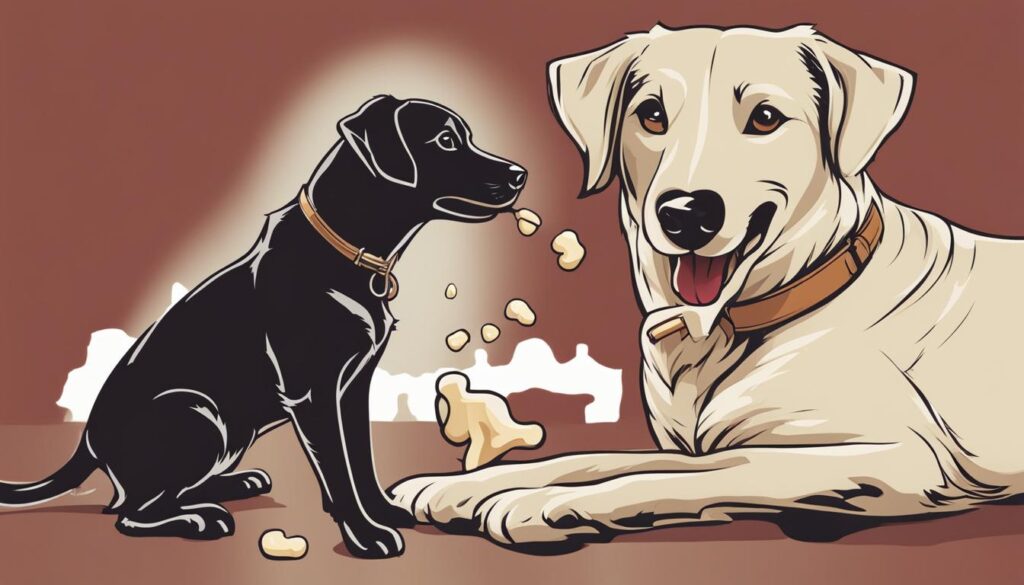In this comprehensive guide, we will explore the importance of calcium in dog diets and why it is vital for your furry friend’s nutrition. Calcium plays a crucial role in various functions in a dog’s body, including muscle movement, skeletal formation, and digestion. It is an essential component that should not be overlooked when it comes to ensuring your dog’s overall health and well-being.
Calcium is not only necessary for maintaining strong bones and teeth but also for supporting muscle function and promoting proper digestion. Dogs require a specific amount of calcium in their daily diet, which can vary based on factors like age, breed, gender, and lifestyle.
Providing your dog with the optimal amount of calcium is crucial in preventing deficiencies or related health conditions. On the other hand, an excess of calcium can also have detrimental effects on your dog’s health. It is essential to find a balance and ensure your dog is getting the right amount of calcium to support their overall well-being.
In the upcoming sections, we will delve deeper into the functions of calcium in a dog’s body, recommended daily calcium intake, food sources of calcium, signs of deficiency and overdose, and the importance of calcium supplements in specific situations. By the end of this guide, you will have a comprehensive understanding of how to incorporate calcium into your dog’s diet and ensure their optimal health.
Functions of Calcium in a Dog’s Body
Calcium plays multiple essential roles in a dog’s body, contributing to various bodily functions and overall health. Understanding these functions can help pet owners recognize the importance of calcium in their dog’s diet and ensure appropriate intake.
One of the primary functions of calcium is its involvement in muscle movement. Calcium ions are crucial for muscle contraction and relaxation, allowing dogs to perform essential activities such as running, jumping, and walking. Without adequate calcium levels, muscle function can be impaired, leading to weakness and mobility issues.
Calcium also plays a vital role in maintaining a healthy heart rhythm. It helps regulate the electrical impulses that coordinate the contraction of the heart muscles, ensuring an efficient pumping of blood throughout the body. Insufficient calcium can disrupt this process, potentially leading to cardiac arrhythmias and other cardiovascular problems.
In addition to supporting muscle and heart health, calcium is essential for promoting skeletal formation in dogs. It is a key component of bones and teeth, providing the structural integrity necessary for overall strength and development. Adequate calcium intake during growth stages is particularly crucial in preventing skeletal abnormalities and disorders like osteoporosis.
Moreover, calcium is involved in various metabolic processes within the body. It stimulates wound healing, aids in blood clotting, promotes hormone release, and facilitates proper digestion. These functions underscore the importance of maintaining a balanced calcium metabolism in dogs and ensuring sufficient intake for optimal overall health.


Table: Functions of Calcium in a Dog’s Body
| Function | Description |
|---|---|
| Muscle Movement | Facilitates muscle contraction and relaxation |
| Heart Rhythm | Regulates the electrical impulses in the heart |
| Skeletal Formation | Contributes to bone and teeth strength and development |
| Wound Healing | Stimulates the healing process of injuries |
| Hormone Release | Promotes the release of essential hormones |
| Digestion | Aids in proper digestion and nutrient absorption |
Recommended Daily Calcium Intake for Dogs
To ensure the optimal health and well-being of your furry friend, it is important to provide the recommended daily intake of calcium. The standard guideline suggests that healthy adult dogs should consume approximately 50 mg of calcium per kilogram of body weight.
However, it’s essential to consider other factors such as age, breed, gender, and lifestyle when determining the specific calcium requirements for your dog. For example, pregnant and nursing dogs require increased calcium intake to support their own health and facilitate the healthy growth of their puppies.
To prevent deficiencies or related health conditions, it is crucial to provide the appropriate amount of calcium. Regular monitoring of your dog’s calcium levels and consulting with your veterinarian can help ensure that your furry companion is receiving the optimal calcium intake for their individual needs.
Factors Affecting Calcium Requirements for Dogs:
- Age: Puppies and senior dogs may have different calcium needs compared to adult dogs.
- Breed: Larger breeds may require higher amounts of calcium for skeletal development.
- Gender: Female dogs may have increased calcium needs during pregnancy and lactation.
- Lifestyle: Active or working dogs may require additional calcium to support their physical activity levels.
| Dog’s Weight (kg) | Recommended Daily Calcium Intake (mg) |
|---|---|
| 5 | 250 |
| 10 | 500 |
| 20 | 1000 |
| 30 | 1500 |
| 40 | 2000 |


Food Sources of Calcium for Dogs
Ensuring that your dog gets an adequate amount of calcium is essential for their overall health and well-being. While most commercial dog kibbles contain calcium, there are also other food sources that you can incorporate into their diet to boost their calcium intake. Here are some calcium-rich dog foods that you can consider:
- Dairy Products: Milk and cheese are excellent sources of calcium for dogs. However, it’s important to note that some dogs may be lactose intolerant, so it’s crucial to monitor your dog’s response to dairy products and consult with your veterinarian if necessary.
- Leafy Green Vegetables: Leafy greens like kale and broccoli are not only packed with vitamins and minerals but are also great sources of calcium for your furry friend.
- Legumes: Certain legumes such as chickpeas and lentils are also good sources of calcium for dogs. Incorporating these into their diet can help meet their calcium requirements.
Remember to ensure that any food additions are safe and suitable for your dog’s specific dietary needs. It’s always a good idea to consult with your veterinarian before making any significant changes to your dog’s diet.
Calcium Content in Select Dog Foods
| Food | Calcium Content per 100g |
|---|---|
| Commercial Dog Kibble A | xxx mg |
| Commercial Dog Kibble B | xxx mg |
| Milk | xxx mg |
| Cheese | xxx mg |
| Kale | xxx mg |
| Broccoli | xxx mg |
| Chickpeas | xxx mg |
| Lentils | xxx mg |
Why Calcium Matters?
Calcium is crucial for dogs as it plays a vital role in the formation and maintenance of strong bones and teeth. It also aids in muscle contraction, nerve function, and blood clotting. Ensuring that your dog receives sufficient calcium is important for their overall growth and development, especially in young puppies and adolescent dogs.
“Adequate calcium intake is essential for the proper functioning and maintenance of your dog’s body. It helps support their skeletal system, muscles, and other vital organs.”
However, it’s important to note that excessive calcium intake can also have adverse effects on your dog’s health. It’s recommended to consult with your veterinarian to determine the appropriate amount of calcium for your dog’s specific needs.
By incorporating calcium-rich foods into your dog’s diet, you can help ensure that they receive the necessary nutrients for optimal health and well-being.
Signs of Calcium Deficiency and Overdose in Dogs
Ensuring that your dog has the right amount of calcium in their diet is essential for their overall health and well-being. However, both deficiency and overdose of calcium can have negative effects on your furry friend. It is important to be aware of the signs that indicate a calcium deficiency or overdose in dogs.
Signs of Calcium Deficiency: When a dog lacks sufficient calcium, they may show symptoms such as muscle tremors, weakness, difficulty standing or walking, restlessness, and even seizures. These signs can indicate a deficiency in calcium levels, which should be addressed promptly. If you notice any of these signs in your dog, it is crucial to consult with your veterinarian to determine the appropriate course of action.
Signs of Calcium Overdose: On the other hand, excessive calcium intake can lead to hypercalcemia in dogs. This condition can manifest as excessive thirst, increased urination, loss of appetite, vomiting, and kidney problems. If you observe these symptoms in your dog, it is important to seek veterinary attention immediately to prevent further complications.
Monitoring your dog’s calcium levels and being aware of these signs can help you provide the necessary care and adjust their diet accordingly. Remember that every dog is unique, and their calcium requirements may vary based on factors such as age, breed, and overall health. Consult with your veterinarian to ensure that your dog is getting the right amount of calcium and to address any concerns regarding their calcium levels.


Symptoms of Calcium Deficiency in Dogs
- Muscle tremors
- Weakness
- Difficulty standing or walking
- Restlessness
- Seizures
Symptoms of Calcium Overdose in Dogs
- Excessive thirst
- Increased urination
- Loss of appetite
- Vomiting
- Kidney problems
Remember that proper nutrition is key to maintaining your dog’s health, and providing the right amount of calcium is an essential part of that. By being aware of the signs of calcium deficiency or overdose, you can ensure that your furry friend receives the best possible care.
Conclusion
So, now you know the importance of calcium in your dog’s diet. Calcium plays a crucial role in various bodily functions, from muscle movement to skeletal formation, and even digestion. It’s essential to ensure that your furry friend gets the right amount of calcium each day to maintain their overall health and well-being.
While most dogs can obtain adequate calcium from their regular diet, there are certain situations where calcium supplementation may be necessary. For example, if your dog is pregnant or following a homemade diet, consulting with your veterinarian about calcium supplements can help ensure they receive the right amount.
Remember, maintaining dog-friendly calcium levels is vital. Too little calcium can lead to deficiencies and related health conditions, while excessive calcium intake can result in imbalances and potential kidney problems. Regular monitoring of your dog’s calcium levels and prompt veterinary attention when needed are key to their optimal health.
By understanding the significance of calcium in your dog’s diet and taking appropriate measures, you can provide them with the necessary nutrients for a long and healthy life. So, keep an eye on their calcium intake and consult with your veterinarian to ensure their well-being!
FAQ
What is the importance of calcium in a dog’s diet?
Calcium is essential for various functions in a dog’s body, including muscle movement, skeletal formation, digestion, and more. It plays a crucial role in maintaining overall health and well-being.
What are the functions of calcium in a dog’s body?
Calcium facilitates muscle movement, keeps the heart in rhythm, stimulates wound healing, prompts hormone release, promotes skeletal formation, and aids in digestion. It is involved in many vital processes in a dog’s body.
What is the recommended daily calcium intake for dogs?
The recommended daily intake of calcium for healthy adult dogs is 50 mg per kilogram of body weight. However, individual factors like age, breed, gender, and lifestyle can influence the specific calcium requirements for each dog.
What are the food sources of calcium for dogs?
Calcium can be obtained from various food sources such as dairy products (milk and cheese), leafy green vegetables (kale and broccoli), and certain legumes (chickpeas and lentils). Most commercial dog kibbles also contain calcium.
What are the signs of calcium deficiency and overdose in dogs?
Signs of calcium deficiency in dogs may include muscle tremors, weakness, difficulty standing or walking, restlessness, and seizures. Excessive intake of calcium can lead to symptoms like excessive thirst, increased urination, loss of appetite, vomiting, and kidney problems.
Do dogs need calcium supplements?
Most dogs can obtain sufficient calcium from their diet. However, certain situations like pregnancy or a homemade diet may require calcium supplementation under veterinary guidance. It is important to monitor calcium levels and consult with a veterinarian to ensure the well-being of dogs.

